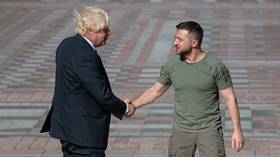The Kiev regime seems stuck between the manic and the delusional in its attempts to keep evading the facts
What do you do when you are losing a war against Russia? In particular, if that war could have been avoided or stopped very quickly and on advantageous terms, but instead you – listening to very false friends – decided to fight on until your country was devastated. And you are also realizing that you have been gambling with your own future as well. That is the key question in Vladimir Zelensky’s life now, whether he can admit it to himself or not.
In such a grim scenario, there are three basic options. Number one, the sane option: you can face reality and start negotiations to end the war, knowing that you will have to largely accept the terms of your opponent (because remember, you are losing, and also Russian President Vladimir Putin has just reiterated in an interview with the primetime ‘60 Minutes’ program that Moscow will only accept an “outcome in its favor” and based “on the realities” that over two years of fighting have produced).
Or option two, the manic one: you can choose reality denial and keep fighting as if you could still win, thereby damaging your country even more and making sure that, in the end, it will still lose but on even worse terms.
Or, finally, option three, the delusional one: you can do what most weak characters do most of the time and try to square the circle by pretending there is a way to have it both ways, that is, to stave off defeat while somehow magically ending the war, or at least slowing it down.
While options two and three both require a hefty degree of self-deception, option three is the craziest because its realization presupposes that your opponent goes along with your wishes in plain contradiction of his own interests and aims. Just as if your side – and not his – were winning the war.
Judging by their recent public statements, Zelensky and his team are currently stuck between the manic and the delusional. But they are not alone: According to a recent Financial Times article on page one, heavily relying on anonymous Ukrainian sources, Kiev and Moscow have entered “preliminary discussions about halting strikes on each other’s energy infrastructure.” The timing of the article was intriguing because it clearly reflected Ukrainian wishful thinking and speculation much more than reality. As one of the diplomats involved put it, “there’s very early talks about potentially restarting something.” It is odd to find something so inchoate that needs so much hedging on page one. Russian presidential spokesman Dmitry Peskov has already made it clear that the Financial Times story was false, reiterating Russia’s conditions for entering negotiations and commenting pointedly that “nowadays there are a lot of bogus stories that have nothing to do with reality,” with “even the most respectable publications” not shying “away from planting this misleading information.”
How did this happen? Things become clearer if we remember that just a week before the publication of the Financial Times piece, Zelensky illustrated the delusional option of how (not) to face the reality of defeat by telling the world that he felt it might make sense to, as it were, dial down the war. Concretely, he proposed that both Ukraine and Russia could cease hitting each other’s energy infrastructure (and, for good measure, Moscow should also throw in sparing Ukraine’s Black Sea ports and shipping).
In particular, the Ukrainian leader argued, stopping energy infrastructure attacks could bring about an end to “the hot phase” of the war. Subsequently, again according to Zelensky, a period of simultaneous, if diminished, warfare and diplomacy could follow. In his own words, “any negotiations […] will mean another stage of the war. This does not mean that there are no defensive or offensive actions. But in any case, when diplomatic steps are taken, it leads to the end of the hot stage of the war.”
Let’s set aside for now the obvious question that seems to have escaped Zelensky’s attention, namely, why Moscow would possibly be interested in such an agreement which transparently favors Ukraine and offers very little, at best, to Russia.
Rather, the first thing to note is that, on the face of it, this was a sensational statement by the Ukrainian leader, because it flatly contradicted both his own earlier position and the policy that his government has officially adopted. According to the latter, any negotiations with Moscow could only begin after a Russian retreat from all territories belonging to Ukraine as of 1991. In practice, this means, of course, that negotiations are impossible, because Russia has no interest in complying with these Ukrainian pre-conditions and, as the war has shown, neither Kiev nor its Western supporters (and users) have the means to compel Moscow to do so. On the contrary, it is Russia that has the initiative.
And yet, there he was, Ukraine’s Khaki-and-Black Man, the intransigent-in-chief seemingly signaling a new flexibility that, if meant seriously, would require a fundamental change of course in Kiev. But, as so often, Zelensky’s statements cannot be taken at face-value. For one thing, only a few days before his leader’s surprising sally, one of Zelensky’s top advisers, Mikhail Podoliak, made use of a long interview in the German paper Die Welt to illustrate the manic option of how (not) to respond to defeat. Outlining policies in comically perfect contradiction to those his boss hinted at, Podoliak insisted on Ukraine’s so-called “victory plan” – in reality, a fresh, expensive wish list of things the West is supposed to deliver, combined with absurdly optimistic assumptions about the future of the war – and argued for things such as economic warfare, taking the war to Russian territory, long-range missile strikes, and, in effect, for waging a war of attrition against Moscow.
Never mind the facts: After a decade of escalating Western economic warfare, Russia’s GDP is projected to grow between 3.6 (according to Western experts) and 3.9% (according to Russia’s Finance Ministry) this year. For comparison: the official government forecast for Germany this year is minus 0.2%. Ukraine’s recent showcase attempt to take the war to Russia has failed abysmally, as even the Washington Post acknowledges. By now, at least part of what remains of the original Kursk invasion force is encircled, and its destruction has not even bought Ukraine time on other fronts. Long-range missile strikes are, of course, the thing that the West has not permitted despite ceaseless pressure and begging by the Zelensky regime, and if that permission will ever come, those strikes won’t make a difference, except by triggering more Russian retaliation. Finally, a war of attrition has been going on for at least two years now, waged – and being won – by Moscow.
But Podoliak, whose career highlights include publicly fuming at a French luxury brand ad because he can’t distinguish the French and Russian flags, has always been a bit of a fantasist and enragé, low on rationality but high on his own emotions. In his recent interview with the German flagship newspaper of hard conservatism, he also insisted that Ukraine’s “victory plan” has a “logic” all of its own, a “mathematical component” complete with “mathematical appendices” of tables and figures that, unfortunately, cannot be revealed to the public. Sounds a tad like your slightly intense uncle building that interstellar spaceship in his garden shed? The difference is your uncle is – probably – harmless.
What was more interesting than yet another display of just how much unhinged fits into the Zelensky administration, were three other points made by Podoliak. He insisted that it still “makes no sense to sit down [for negotiations] with the Russian Federation”; that there is “no room for compromise”; and, finally and most intriguingly, that “giving in to Russia’s demands” would lead to nothing else but “continuing the war in a different shape.” Yet continuing the war but in a different, post-”hot phase” shape – accompanied by those negotiations which Podoliak sees as meaningless and minus attacks on certain infrastructures – is exactly what Zelensky has proposed.
What to make of this mess? It is not as if either the Ukrainian leader or his adviser have addressed the glaring discrepancies between their ideas. It does not seem they care. Inconsistency to the point of absurdity is part of the Zelensky regime’s standard repertoire. As you would expect, that degree of unpredictability or even bad faith in Kiev is, in and of itself, an obstacle to meaningful negotiations with Russia, as both Putin and the Russian foreign minister have noted.
In addition, Zelensky’s initiative in particular is all too obviously a fairly desperate and dishonest ad hoc response to various worsening circumstances, inside Ukraine and abroad: To list only a few, in the West, the “victory plan” still touted by Podoliak has, in essence, fallen through, while there is increasing mass media chatter about giving up on retaking territory now held by Russia. At home, Ukraine’s mobilization plan has ended in “total failure,” as Ukrainian outlet Strana.ua reports. In addition, two things are coming that bode ill for the Zelensky regime: the US elections and winter.
Regarding the American elections, they may well be won by Donald Trump, whose polls are improving again, while those of his opponent Kamala Harris are, at best, stagnating. Momentum may be an over-used term, but in this case, it is now clearly on Trump’s side. And Trump has made no secret of his plans to cut Ukraine loose even more brutally than a Harris administration would also do, if, perhaps, a little more slowly. Finally, winter is, of course, the most immediate cause for Zelensky’s talk about energy infrastructure. Under Russian attack, that of Ukraine is in tatters and on the verge of collapse.
The most plausible reading of Zelensky’s odd initiative is as a sign of both despair and obstinacy. In essence, the Ukrainian leader has asked Russia to agree to replace a war Moscow is winning with a war that, Zelensky believes, he can still at least not lose. It is hard to see why Russia would take such a deal, especially if it is explicitly advertised as initiating a new phase of the war that would allow the Zelensky regime a breathing space to pursue its aim of somehow still securing NATO membership for whatever will be left of Ukraine.
In fact, ironically, Zelensky has probably merely betrayed his own weakness and inability to face reality and seek peace in a manner consistent with it, namely by giving up on NATO for good and making territorial concessions, minimum conditions just reiterated by Peskov. Zelensky’s adviser, Mikhail Podoliak, meanwhile, has made things even worse, by reminding Moscow of just how unreliable any Zelensky regime talk of “de-escalation” is.
The statements, views and opinions expressed in this column are solely those of the author and do not necessarily represent those of RT.





